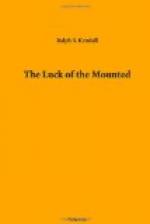The stranger whistled incredulously. “Wha-a-tt!” he almost shouted, “D’ye mean to tell me that bear got within twenty yards of you and couldn’t catch you? Why, man! It’s incredible!”
“Fact,” replied MacDavid calmly, knocking the ashes out of his pipe, “It was this way: It was near th’ edge of th’ bush where th’ bear first jumped me, an’—just as we hit th’ open ground—one o’ them warm Chinook winds sprung up behind us, travellin’ east. . . .
“Man!” He paused impressively. “The way that wind started in to melt th’ snow was a corker—just like lard in a fryin’-pan. But—I just managed to keep ahead of it an’ while I had a good, hard surface of snow to run on, the bear—why he was sloppin around in th’ slush in my wake—couldn’t get a firm foothold, I guess. . . .”
His keen blue orbs stared full into the bleached ones of his vis-a-vis.
“I figure that there Chinook an’ me an’ th’ bear must have been all travellin’ ‘bout th’ same line of speed—kind of swift. After a mile or two of it, th’ bear—he got fed up an’ quit cold,” he ended gravely. “Why—what’s your hurry, Fred?”
But that individual, feebly raising both arms with a sort of hopeless gesture, suddenly grabbed up his mail and beat a hasty retreat to his horse.
The hoof-beats died away and MacDavid turned to the grinning policemen. “Fred Storey,” he said, in answer to their looks of silent enquiry. “Runs th’ R.U. Ranch, out south here. Not a bad head, but”—he sighed deeply—“he’s such an ungodly liar. I can’t resist gettin’ back at him now an’ again—just for luck. He’s up here on a visit—stayin’ with th’ Sawyers.”
“H-mm!” ejaculated Yorke, “seems to me I’ve got a hazy recollection of meeting up with that fellow before—somewhere. In a hotel in High River, I think it was. Beggar was yarning about Cuba, I remember.”
“Bet it was hazy all right,” was Redmond’s sarcastic rejoiner, “like most of your bar-room recollections, Yorkey.” He gave vent to a snorting chuckle. “That ‘D’you know? Ya! ya!’ accent of his reminds me of that curate in ‘The Private Secretary.’ I saw it played to Toronto, once.”
At this juncture the door opened, and a trio of Indians padded softly into the store with gaily-beaded, moccasined feet. Two elderly bucks and a young squaw. The latter flashed a shy, roguish grin at the white men, and then with the customary effacement of Indian women withdrew to the rear of the store. Squatting down, all huddled-up in her blanket, she peered at them with the incurious, but all-seeing stare of her tribe. George got an impression of beady black eyes and a brown, rounded, child-like face framed in a dazzling yellow kerchief.
The two bucks, with a momentary gleam of welcome wrinkling their ruthless, impassive features, exchanged a salutation with MacDavid in guttural Cree, which language the latter spoke fluently. They were clothed in the customary fashion of their tribe—with a sort of blanket-capote garment reaching below the knee, their lower limbs swathed in strips of blanket, wound puttee-wise. Battered old felt hats comprised their head-gear, below which escaped two plaited pig-tails of coarse, mane-like, black hair, the latter parted at the nape of the neck and dangling forward down their broad chests.




